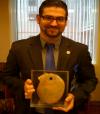Having Anxiety. Holter Moniter Showed Benign PVC's. ECHO Test Showed Mitral Valve Is Mildly Thickened. Guide?

Question: I have had an echo recently and I really do not want to worry about it since I am a constant worrier with high anxiety.
So, here goes....I started having PVC's right after I had my son who is now 17 months old.
Was sent to a Cardiologist as just a precautionary measure.
Holter moniter showed benign PVC's. But, because of me still worrying the cardiologist set up an echo.
The results are as follows:
LV: The left ventricle is normal in size with normal systolic function. The ejection fraction is 61%. The left ventricular regional wall motion is normal.
LA: The left atrium is normal. The left atrial pressure is normal.
RV: The right ventricle is normal in size with normal function. the inter-ventricular septal motion normal.
RA: The right atrium is normal
MV: There is trace mitral regurgitation. Effective regurgitant orifice area=(PISA radius=, Aliasing velocity=, MR peak velocity= 559cm/sec) which is consistent with regurgitation. The mitral valve is mildly thickened.
AV: The aortic valve is normal and trileaflet. Antegrade velocity= 170 cm/sec
TV: The tricuspid valve is normal. There is trace tricuspid regurgitation. The PASP is normal. PASP= 36 mmHG, estimated RAP= 10mmHG.
PV: The pulmonic valve is normal. There is physiologic pulmonic regurgitation (peak gradient=4mmHG)
Peri: The pericardium is normal
PA: The pulmonary artery is normal
IAS: The interatrial septum is normal
AO: The aortic root is normal. The aortic arch is normal. Aortic dimension Ao M-mode= 2.45 cm.
Cava: The inferior vena cava is normal. There is greater than 50% inspiratory collapse of the IVC. The superior vena cava is normal.
Conclusion:
Normal left ventricular systolic function. LVEF=61%
Normal right ventricular size with normal function
The mitral valve is mildly thickened
I am most worried of course about the mitral valve thickening and the trace regurgitation of the mitral valve, triscuspid regurgigation, and physiologic pulmonic regurgitation.
So, here goes....I started having PVC's right after I had my son who is now 17 months old.
Was sent to a Cardiologist as just a precautionary measure.
Holter moniter showed benign PVC's. But, because of me still worrying the cardiologist set up an echo.
The results are as follows:
LV: The left ventricle is normal in size with normal systolic function. The ejection fraction is 61%. The left ventricular regional wall motion is normal.
LA: The left atrium is normal. The left atrial pressure is normal.
RV: The right ventricle is normal in size with normal function. the inter-ventricular septal motion normal.
RA: The right atrium is normal
MV: There is trace mitral regurgitation. Effective regurgitant orifice area=(PISA radius=, Aliasing velocity=, MR peak velocity= 559cm/sec) which is consistent with regurgitation. The mitral valve is mildly thickened.
AV: The aortic valve is normal and trileaflet. Antegrade velocity= 170 cm/sec
TV: The tricuspid valve is normal. There is trace tricuspid regurgitation. The PASP is normal. PASP= 36 mmHG, estimated RAP= 10mmHG.
PV: The pulmonic valve is normal. There is physiologic pulmonic regurgitation (peak gradient=4mmHG)
Peri: The pericardium is normal
PA: The pulmonary artery is normal
IAS: The interatrial septum is normal
AO: The aortic root is normal. The aortic arch is normal. Aortic dimension Ao M-mode= 2.45 cm.
Cava: The inferior vena cava is normal. There is greater than 50% inspiratory collapse of the IVC. The superior vena cava is normal.
Conclusion:
Normal left ventricular systolic function. LVEF=61%
Normal right ventricular size with normal function
The mitral valve is mildly thickened
I am most worried of course about the mitral valve thickening and the trace regurgitation of the mitral valve, triscuspid regurgigation, and physiologic pulmonic regurgitation.
Dear XXXXXXX
Thanks for sharing your concerns.
Hope this brings peace of mind to you; all the aforementioned findings are considered trivial, meaning that they don't have impact on the heart function, cardiovascular events or longevity.
The study essentially reads: practically normal heart structure. Valves can thicken and usually do as we age, so we will all suffer the consequences of time. Some degree of tricuspid regurgitation is normal like in your case, and because of the structure of the pulmonary valve same applies.
No major worries from my perspective as cardiologist, wish you the best health, blessings,
Dr Brenes-Salazar MD
Mayo Clinic
Cardiology
Thanks for sharing your concerns.
Hope this brings peace of mind to you; all the aforementioned findings are considered trivial, meaning that they don't have impact on the heart function, cardiovascular events or longevity.
The study essentially reads: practically normal heart structure. Valves can thicken and usually do as we age, so we will all suffer the consequences of time. Some degree of tricuspid regurgitation is normal like in your case, and because of the structure of the pulmonary valve same applies.
No major worries from my perspective as cardiologist, wish you the best health, blessings,
Dr Brenes-Salazar MD
Mayo Clinic
Cardiology
Note: For further queries related to coronary artery disease and prevention, click here.
Above answer was peer-reviewed by :
Dr. Raju A.T

Answered by

Get personalised answers from verified doctor in minutes across 80+ specialties



